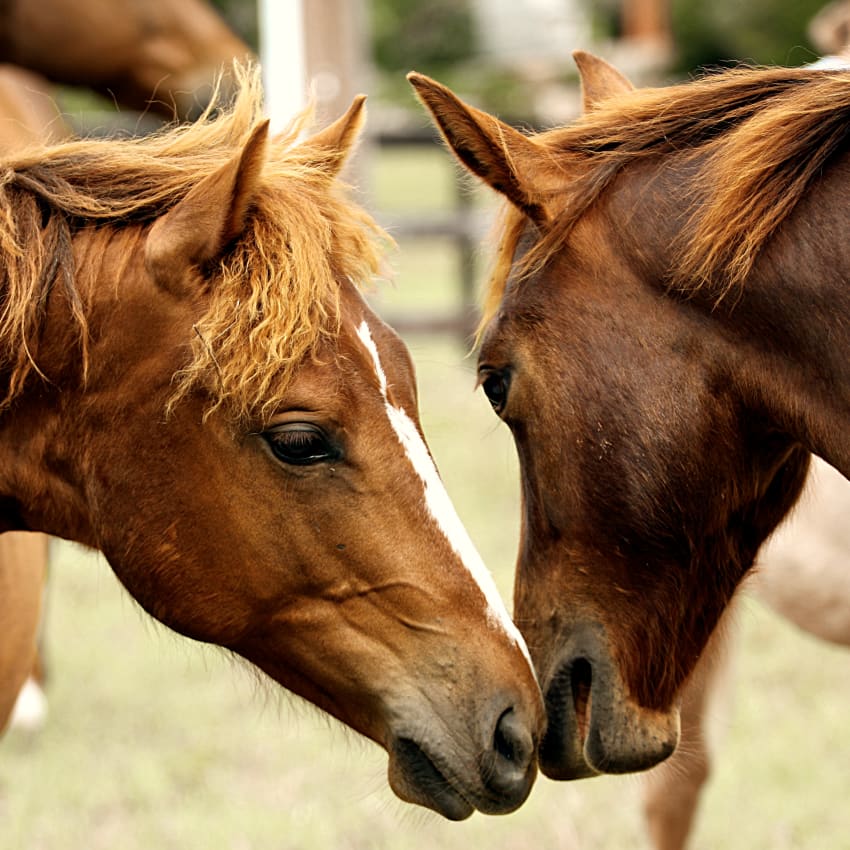Protection & Prevention
At Northwest Veterinary Clinic of Mount Vernon, we focus on preventive care to keep common diseases and disorders from developing in your horse and spreading to your entire herd.
Combined with regular wellness exams, equine vaccinations and parasite prevention form the foundation of your horse's routine healthcare.
Preventive care gives your horse the best chance at a long, healthy life. Our team will work with you to create a custom preventive care plan that is tailored to their unique needs, lifestyle, and potential risk,

Types of Vaccinations For Mount Vernon Horses
Our veterinarians regularly review the available vaccines and dewormers and consult with leading experts to select those products that are the safest and most effective.
The following are the two different categories of equine vaccinations that we provide.
Core Vaccinations
The five core diseases that all have significant fatality rates in horses are:
- Rabies
- West Nile virus
- Eastern and Western equine encephalomyelitis
- Tetanus.
All horses can be exposed to these potentially fatal diseases and need to be vaccinated annually according to the American Association of Equine Practitioners.
Risk-Based Vaccinations
The following vaccinations are given if your horse's lifestyle may put them at risk:
- Equine influenza virus
- Herpesvirus
- Strangles
- Equine viral arteritis
- Rotaviral diarrhea
- Leptospirosis
- Potomac horse fever
- Botulism
- Anthrax
- Snake bites
Vaccination will vary depending on your horse’s unique lifestyle and environment.
The Importance of Dewormers for Herd Health
Most horses only need to be dewormed once or twice a year. Before deworming in the spring, we recommend having a fecal done. This procedure allows us to measure the number of worm eggs a horse is shedding in its feces.
While most horses shed very few worm eggs, some will shed high numbers of eggs and are more likely to infect the rest of the herd. Internal parasites can cause many problems in horses, such as colic, anemia, ill-thrift, and diarrhea.
Types of Dewormers
Based on the results attained in your horse's fecal exam, we will recommend whether you need to deworm your horse.
The different types of dewormers include:
- Fenbendazole
Targets roundworms, bloodworms, and pinworms.
- Ivermectin
Targets all parasites except tapeworms. However, resistance to ivermectin is high in roundworms.
- Ivermectin and Praziquantel
Targets all parasites. However, resistance to ivermectin is high in roundworms.
- Moxidectin
Targets all parasites except tapeworms. However, resistance to moxidectin is high in roundworms.
- Moxidectin and Praziquantel
Targets all parasites. However, resistance to moxidectin is high in roundworms.
- Pyrantel
Targets bloodworms, pinworms, and roundworms.
Common Parasites
Several common parasites can cause issues for horses.
The following are both internal and external parasites that our Mount Vernon vets recommend deworming against.
- Roundworms
Most common in horses less than one-year-old and very old animals due to decreased immunity. They migrate through the trachea and live in the small intestine
In young horses, roundworms cause poor growth and development as well as respiratory signs. Young animals with bad cases can have obstructed intestines leading to colic and possibly death. Older affected horses may have a poor hair coat, weight loss, or decreased performance
- Bloodworms
These worms can migrate through the arteries around the large intestines and cause colic. Bloodworms used to be a major problem in horses, but their occurrence and significance has decreased with appropriate deworming
- Cyathostomins
This type of parasite lives in the large intestine and migrates into the wall of the intestine. Cyathostomins cause severe gastrointestinal signs such as decreased appetite and diarrhea.
Resistance to dewormers is increasing in these worms, so targeted deworming is especially important
- Pinworms
Most common in horses less than two years old or horses with poor management. Worms live in the large intestine, but they deposit their eggs around the horse’s anus causing the horse to have an itchy hind end. It’s difficult to treat and control pinworms so good horse and pasture management is important.
- Tapeworms
Horses become infected with tapeworms by eating small pasture mites during grazing. These worms attach to areas of the bowel lining causing thickening, inflammation, and ulceration of the intestinal wall. Since these worms spend part of their life living on mites, they are difficult to control.
Tapeworms don’t seem to cause many diseases in horses. While colic is considered a risk with this type of worm, the incidence is quite low.
- Bots Flies
Bots flies lay their eggs on the horse’s coat in late summer and early fall. The eggs show up as small yellow specks, mainly on the horses’ legs. Horses ingest bot eggs while licking or scratching their legs, then the eggs develop into larvae in the equine stomach and small intestine.
The larvae are passed out through feces and hatch in the spring. Botflies rarely cause clinical signs in horses, but they can cause gastric ulcers.
